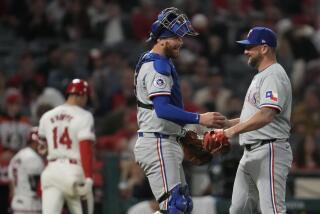Rangers’ moves and play are on the money, even if bottom line isn’t
Reporting from Arlington, Texas — The Texas Rangers have had a for-sale sign in the yard for more than a year and have been in Chapter 11 bankruptcy since May, the ownership situation growing so convoluted that on Wednesday the team will go up for public auction, like some antique armoire or piece of jewelry.
Amid such chaos — squabbling among attorneys, complaints from angry creditors, speculation that controversial Dallas Mavericks owner Mark Cuban will bid for the club — the Rangers thrive.
They entered Saturday with a 57-40 record, a seven-game lead over the Angels in the American League West and a balanced club that has added competent starting pitching, dominant relievers and dazzling defense to its usual offensive firepower.
A very good team got even better this month when the Rangers traded for two veterans who could boost them from division contenders to legitimate World Series threats, pitcher Cliff Lee from Seattle and catcher Bengie Molina from San Francisco.
Not only that, Texas got the Mariners to pay about $2.5 million of the $4.2 million left on Lee’s contract and the Giants to pay almost all of the $2.2 million left on Molina’s contract.
All of which must make followers of the pitching-thin Dodgers, who fell short in their pursuit of Lee, wonder what in the name of the McCourt divorce proceedings is going on here?
The Rangers are in dire financial straits, yet they acquired a front-of-the-rotation starter and a proven, clutch-hitting catcher, and they added a mere $4 million to their $65-million payroll.
The Dodgers have an $83-million payroll and claim they are not financially handicapped by the McCourt divorce, but they have yet to put their money where their mouths — or the impact players — are.
“These guys are figuring out how to shop on a budget,” reliever Darren O’Day said of the Texas front office. “Though we’re tight on money, we were able to get the two pieces we needed.”
The Rangers’ aggressive young general manager, 32-year-old Jon Daniels, whose imprint is all over this team — he acquired shortstop Elvis Andrus, closer Neftali Feliz, designated hitter Vladimir Guerrero, right fielder Nelson Cruz and pitchers Rich Harden and Darren Oliver — deserves much of the credit.
But Daniels is quick to praise his scouts, player development staff and minor league coaches and instructors, who have shaped a system that Baseball America ranked the fourth-best in baseball in 2008, the best in 2009 and second-best this season.
An abundance of coveted prospects — and Daniels’ willingness to part with them — is the reason Lee and Molina are Rangers today.
“There are two things that have value in this game: dollars and young players,” Daniels said. “To some degree, our young players were currency.”
In exchange for payroll relief, the Rangers gave up more in talent for Lee and Molina.
For Lee, who beat the Angels on Thursday, and big reliever Mark Lowe, Texas gave up first baseman Justin Smoak, Baseball America’s No. 2 overall prospect entering 2010; pitcher Blake Beavan, a first-round pick in 2007; hard-throwing reliever Josh Lueke and scrappy second baseman Matt Lawson.
Molina cost the Rangers big league reliever Chris Ray and right-hander Michael Main, a first-round pick in 2007.
“We’re in a position,” Daniels said, “where we want to step on the gas.”
The Rangers, who haven’t reached the playoffs since 1999, are in the driver’s seat.
“The organization has done a great job to put us in a position to acquire these guys,” second baseman Ian Kinsler said. “Now, it’s up to us. We have to play the games. We can’t just PlayStation 3 simulate stuff.”
Texas Manager Ron Washington, called by a federal bankruptcy judge to testify Thursday, said players’ morale might suffer if the sale of the team was delayed, but there is no corroborating evidence in the clubhouse.
“The bankruptcy hasn’t been a distraction at all, because this team is good at weeding out stuff that isn’t important,” third baseman Michael Young said. “We just come to the park and try to outwork the team we’re playing. We have a real blue-collar mentality, and it has paid dividends.
“In the past, we worried about things like the trade deadline, who we could acquire over the winter. The biggest thing with this club is we’re a real focused group.”
That was evident in March, when SI.com reported that Washington tested positive for cocaine in July 2009.
Washington subjected himself to extensive drug testing and apologized for his “mistake.” Team President Nolan Ryan and Daniels stood by the manager, as did the players.
“When everything came out, the guys instantly kind of locked arms and . . . I don’t want to be cheesy, but it was like an ‘O Captain! My Captain!’ moment, from ‘Dead Poets Society,’ ” Daniels said.
“The players said, ‘Hey, you’re our guy, you’ve been there for us, we’re going to be there for you.’ That’s kind of held true.”
Daniels doesn’t think it’s a coincidence that tempestuous outfielder Milton Bradley had the best year of his career under Washington in 2008, when he hit .321 with 22 home runs and 77 runs batted in for the Rangers.
“I think a lot of it is because of the atmosphere Ron and the staff and the players create here,” Daniels said. “I don’t think Ron gets enough credit. This team has taken on his personality.
“He’s a winner, a survivor, a guy who believes in hard work and perseverance, and you see that in our club. They never give up. They play nine innings. It’s been fun to watch.”
More to Read
Go beyond the scoreboard
Get the latest on L.A.'s teams in the daily Sports Report newsletter.
You may occasionally receive promotional content from the Los Angeles Times.







